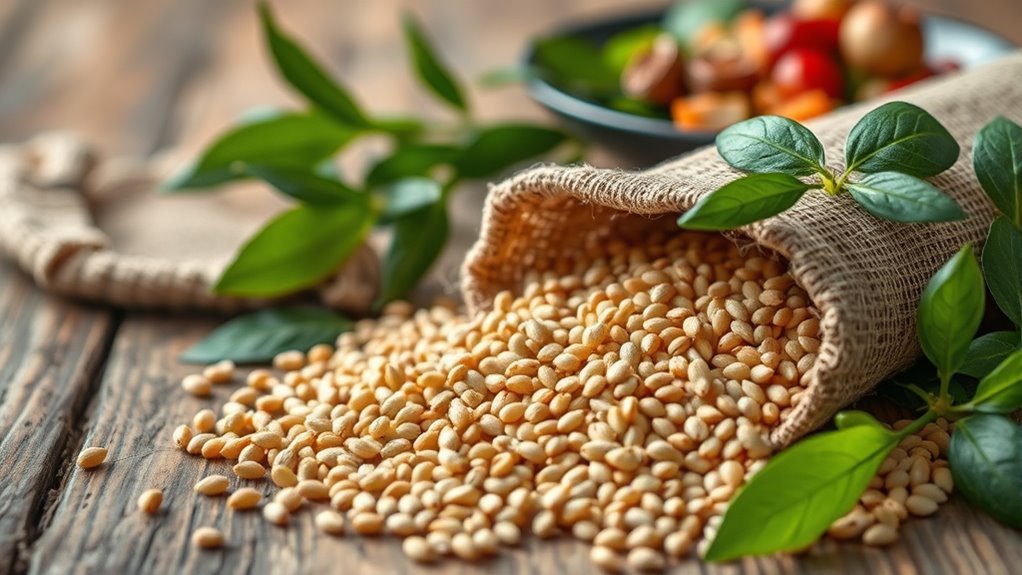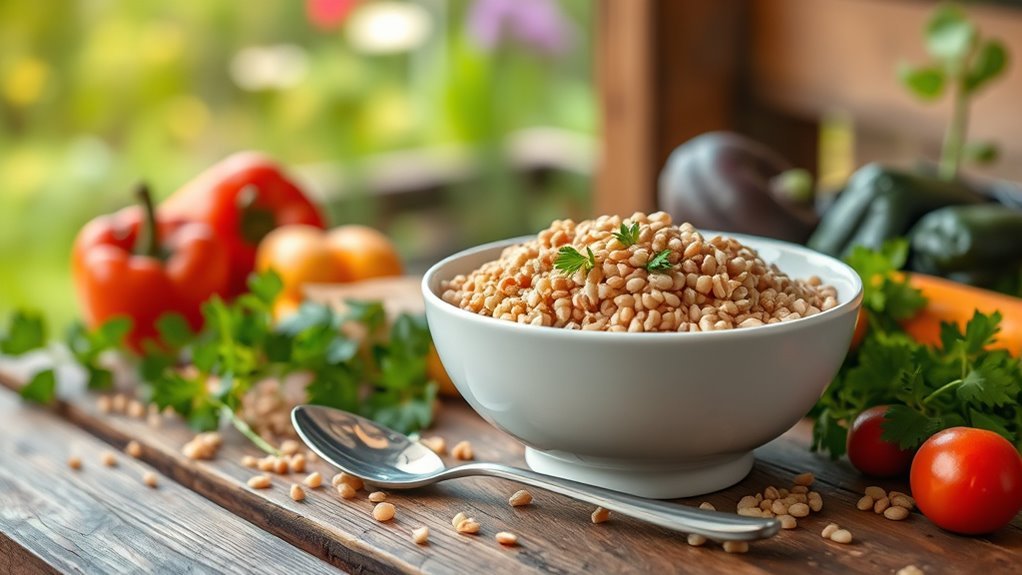Buckwheat isn’t strictly keto-friendly due to its higher carbohydrate content, with around 20 grams per cooked cup. Although it offers various health benefits, including being a complete protein and rich in nutrients, its moderate glycemic index may affect blood sugar levels. You can incorporate it in moderation with careful portion control. Using buckwheat flour for low-carb snacks or adding small amounts to salads can work. Discover more about balancing buckwheat in your keto diet to fit your goals.
Understanding Buckwheat: What Is It?

Buckwheat, despite its name, isn’t actually a type of wheat; it’s a seed from the plant Fagopyrum esculentum. Originating in Southeast Asia, it has gained popularity worldwide due to its unique flavor and versatility. You might be surprised to learn that buckwheat is gluten-free, making it a great choice for those with gluten sensitivities or celiac disease. Its health benefits are significant as well; it’s rich in antioxidants, vitamins, and minerals, which can support heart health and stabilize blood sugar levels. Additionally, buckwheat’s high fiber content can promote digestive health. Embracing buckwheat in your diet can offer a delicious way to nourish your body while exploring diverse culinary traditions.
Nutritional Profile of Buckwheat

The nutritional profile of buckwheat makes it an intriguing option for those seeking healthy alternatives to traditional grains. Rich in protein and fiber, buckwheat offers numerous health benefits, including improved digestion and heart health. Its unique combination of essential amino acids and antioxidants highlights its nutritional value. Historically, people have cultivated buckwheat for centuries, especially in Asia and Eastern Europe, where it’s prized for its versatility and nutritional density. Unlike wheat, buckwheat is gluten-free, making it suitable for a variety of diets. Incorporating buckwheat into your meals can enhance nutrient intake while providing a satisfying, hearty texture. With its impressive profile, it’s no wonder many are rediscovering the buckwheat benefits that have stood the test of time.
Carbohydrate Content: Is It Too High for Keto?

How does buckwheat’s carbohydrate content measure up for those following a ketogenic diet? Buckwheat contains around 20 grams of carbohydrates per cooked cup. While this might seem high, it’s important to evaluate the net carbs, which are about 14 grams after accounting for fiber. With a relatively low glycemic load, buckwheat doesn’t spike your blood sugar as much as other grains do. However, for strict keto followers aiming for under 20-50 grams of net carbs daily, consuming buckwheat can quickly use up that allowance. If you’re looking for variety while keeping your carb intake in check, you might enjoy buckwheat in moderation. Ultimately, it’s about finding the right balance that fits your lifestyle and dietary needs.
Comparing Buckwheat to Other Grains
When comparing buckwheat to other grains, it’s important to look at their nutritional profiles, glycemic indexes, and carbohydrate content. Buckwheat stands out with its unique nutrient composition, but how does it stack up against popular grains like rice or wheat? Understanding these differences can help you make more informed choices for your diet, especially if you’re considering keto.
Nutritional Profile Comparison
While many grains provide essential nutrients, buckwheat stands out due to its unique nutritional profile. It offers a variety of benefits that set it apart from traditional grains, especially for those maneuvering keto misconceptions. Here’s how it compares:
- Protein: Buckwheat contains all nine essential amino acids, making it a complete protein source.
- Fiber: It’s rich in dietary fiber, promoting digestive health and satiety.
- Vitamins & Minerals: Buckwheat boasts high levels of magnesium, manganese, and B vitamins, supporting overall wellness.
- Antioxidants: This grain is packed with antioxidants, which can help combat oxidative stress.
Incorporating buckwheat into your diet can enhance your nutritional intake while providing delicious versatility. Enjoy the freedom to explore its benefits!
Glycemic Index Analysis
Understanding the glycemic index (GI) of foods is essential for anyone managing their carbohydrate intake, especially on a keto diet. The GI measures how foods affect your blood sugar levels, which is vital for controlling insulin levels and minimizing glycemic response.
Here’s a comparison of buckwheat to other common grains:
| Grain | Glycemic Index |
|---|---|
| Buckwheat | 54 |
| White Rice | 73 |
| Quinoa | 53 |
While buckwheat has a moderate GI, it can still cause a lower glycemic response compared to white rice. This means it may help you maintain stable energy levels, making it a potentially better option for those seeking dietary freedom while managing carbs effectively.
Carbohydrate Content Differences
Although many grains are often dismissed on a keto diet, it’s important to compare their carbohydrate content to make informed choices. Buckwheat varieties, often misunderstood due to keto misconceptions, actually offer some unique benefits. Here’s how they stack up against other grains:
- Buckwheat: About 21g of carbs per 100g.
- Quinoa: Roughly 21g of carbs per 100g; similar to buckwheat.
- Brown Rice: Approximately 23g of carbs per 100g, slightly higher.
- Oats: Around 66g of carbs per 100g, considerably higher than buckwheat.
While buckwheat does contain carbs, its nutritional profile and fiber content can make it a more suitable option for those seeking variety without fully abandoning their keto goals.
The Impact of Buckwheat on Ketosis
When you’re following a ketogenic diet, the foods you choose can profoundly impact your state of ketosis. While buckwheat is often praised for its nutritional benefits, including fiber and antioxidants, it’s also relatively high in carbohydrates. Consuming buckwheat can affect ketosis, as its carb content might push you over your daily limit, hindering your body’s ability to burn fat for fuel. However, some studies suggest that the fiber in buckwheat could help regulate blood sugar levels, potentially offering benefits when consumed in moderation. Ultimately, understanding the ketosis effects of buckwheat allows you to make informed choices, ensuring that you maintain the balance you seek on your keto journey while enjoying the unique advantages this grain can provide.
How to Incorporate Buckwheat Into a Keto Diet
If you’re looking to incorporate buckwheat into your keto diet, there are a few strategies you can consider. Start by exploring low-carb buckwheat options and creative recipes that fit within your dietary goals. Additionally, practicing portion control can help you enjoy buckwheat without disrupting your ketosis.
Low-Carb Buckwheat Options
While buckwheat is often considered a whole grain, its potential role in a keto diet can be tricky due to its carbohydrate content. However, you can still enjoy this nutritious seed by incorporating it wisely. Here are some low-carb buckwheat options:
- Buckwheat Groats: Use them in moderation as a base for salads or bowls, pairing with low-carb veggies.
- Buckwheat Noodles: Choose these for a unique twist in keto-friendly meals, balancing with protein-rich sauces.
- Buckwheat Flour: Substitute it for a portion of regular flour in low carb snacks like keto pancakes or muffins.
- Buckwheat Porridge: Make a small serving with almond milk and nuts for a hearty breakfast option.
Creative Buckwheat Recipes
Although incorporating buckwheat into a keto diet might seem challenging due to its carbohydrate content, there are plenty of creative recipes that can make this nutritious seed a delightful addition to your meals. You can start your day with buckwheat pancakes, which can be made using a combination of almond flour and flaxseed to lower the carb count. Simply mix these ingredients with buckwheat flour for a satisfying breakfast treat. For lunch or dinner, consider whipping up savory buckwheat bowls. Combine cooked buckwheat with sautéed vegetables, avocado, and your choice of protein for a hearty, low-carb meal. These recipes not only diversify your diet but also provide essential nutrients, allowing you to enjoy the benefits of buckwheat without compromising your keto goals.
Portion Control Strategies
How can you enjoy buckwheat on a keto diet without overstepping your carb limits? It’s all about portion sizes and mindful eating. Here are some strategies to keep you on track:
- Measure your servings: Start with 1/4 cup of cooked buckwheat to control carb intake.
- Incorporate it wisely: Use it as a side dish rather than the main event in your meal planning.
- Mix it up: Combine buckwheat with low-carb vegetables to enhance flavor without adding too many carbs.
- Snack smart: Try buckwheat-based crackers in moderation for a crunchy treat.
Alternatives to Buckwheat for Keto Dieters
If you’re on a keto diet and looking for alternatives to buckwheat, you’ve got several nutritious options to contemplate. Almond flour and coconut flour serve as excellent low-carb substitutes for baking. For a rice alternative, consider cauliflower rice, which is low in carbs and high in fiber. Zucchini noodles and shirataki noodles offer a pasta-like experience without the carbs. Eggplant slices can be used in dishes like lasagna or as a pizza base. Don’t forget leafy greens, which can bulk up meals while keeping carb counts low. For added nutrition, sprinkle in hemp hearts or flaxseed meal for healthy fats. These alternatives not only fit your diet but also keep your meals diverse and satisfying.
Final Thoughts on Buckwheat and the Keto Lifestyle
While buckwheat is often praised for its nutritional benefits, it doesn’t quite fit into a strict keto lifestyle due to its relatively high carbohydrate content. If you’re contemplating incorporating buckwheat into your diet, it’s important to weigh the buckwheat benefits against the keto challenges you might face. Here are some key points to reflect on:
- Nutrient Density: Buckwheat is rich in vitamins and minerals.
- Fiber Content: It offers a good amount of dietary fiber.
- Glycemic Index: Its glycemic index may affect your blood sugar levels.
- Portion Control: You’ll need to watch portion sizes to stay within carb limits.
Ultimately, balance is key. If you enjoy buckwheat, be mindful of how it aligns with your keto goals.
Frequently Asked Questions
Can I Eat Buckwheat if I’m Not on a Keto Diet?
Sure, you can definitely eat buckwheat even if you’re not on a keto diet! Its nutritional value is impressive, offering protein, fiber, and essential minerals. Buckwheat’s culinary uses are diverse; you can enjoy it in salads, as porridge, or in baked goods. It’s a great gluten-free alternative that can add variety to your meals while providing health benefits. So, feel free to incorporate it into your diet for a nutritious boost!
What Are the Health Benefits of Buckwheat?
Buckwheat offers numerous health benefits thanks to its impressive nutritional profile. It’s packed with dietary fiber, which aids digestion and helps you feel full longer. Additionally, buckwheat is rich in antioxidants, vitamins, and minerals that support overall health. You’ll find that incorporating it into your meals can help manage blood sugar levels and lower cholesterol. So, if you’re looking for a nutritious grain alternative, buckwheat might be a great option for you!
Is Buckwheat Gluten-Free?
You might be surprised to learn that buckwheat is indeed gluten-free! For those with gluten sensitivity, it’s a fantastic alternative to wheat-based grains. Buckwheat nutrition is impressive, packed with essential amino acids, fiber, and antioxidants. By incorporating it into your meals, you’re not only enjoying a versatile ingredient but also benefiting from its health properties. So, if you’re looking for a gluten-free option, buckwheat could be your new go-to!
How Does Buckwheat Affect Blood Sugar Levels?
When it comes to buckwheat and blood sugar, it’s good to know that it has a relatively low glycemic index. This means it’s less likely to cause rapid spikes in blood sugar levels compared to other grains. Eating buckwheat can provide you with sustained energy and help maintain stable blood sugar levels. It’s a nutritious option if you’re seeking a balanced diet while keeping an eye on your blood sugar management.
Can Buckwheat Be Used in Baking for Keto Recipes?
When you’re diving into keto baking, you might wonder if buckwheat fits the bill. While it’s often hailed as a nutritious grain alternative, buckwheat isn’t the best low carb alternative for strict keto dieters due to its higher carbohydrate content. However, if you’re exploring more flexible low-carb diets, buckwheat can add a unique flavor and texture to your recipes. Just remember to balance it out with other low carb ingredients for a successful bake!
Frequently Asked Questions about Buckwheat and Keto
1. Is buckwheat considered a keto-friendly food?
Buckwheat is not typically considered keto-friendly due to its higher carbohydrate content. A 100-gram serving of cooked buckwheat contains approximately 20 grams of carbohydrates, which can exceed the daily carb limit for those following a strict ketogenic diet. However, it can be consumed in moderation if you carefully monitor your overall carb intake.
2. What are the nutritional benefits of buckwheat?
Buckwheat is rich in essential nutrients, including protein, fiber, vitamins, and minerals. It provides a good source of magnesium, manganese, and antioxidants. Additionally, buckwheat is gluten-free, making it suitable for those with gluten sensitivities. Its high fiber content can aid in digestion and promote a feeling of fullness, which can be beneficial for weight management.
3. Can buckwheat be incorporated into a low-carb diet?
While buckwheat is not ideal for a strict ketogenic diet, it can be included in a low-carb diet if consumed in limited portions. Pairing buckwheat with low-carb vegetables and proteins can help balance your meal. It’s important to track your total carbohydrate intake throughout the day to maintain your low-carb goals.
4. Are there any keto alternatives to buckwheat?
Yes, there are several keto-friendly alternatives to buckwheat. Options such as cauliflower rice, zucchini noodles, and shirataki noodles are excellent substitutes for those looking to reduce their carbohydrate intake. Additionally, almond flour and coconut flour can be used in baking or cooking as low-carb alternatives to buckwheat flour.
5. How should buckwheat be prepared for the best health benefits?
To maximize the health benefits of buckwheat, it is recommended to soak the groats before cooking. Soaking can help reduce anti-nutrients and enhance nutrient absorption. Cook buckwheat in water or broth for added flavor, and consider mixing it with non-starchy vegetables and healthy fats to create a balanced meal. Always keep portion sizes in mind, especially if you’re monitoring your carbohydrate intake.
References
- https://www.ncbi.nlm.nih.gov/pmc/articles/PMC6472306/
- https://www.healthline.com/nutrition/buckwheat
- https://www.washingtonpost.com/food/2020/07/15/buckwheat-keto/
- https://www.sciencedirect.com/topics/agricultural-and-biological-sciences/buckwheat
- https://www.nutrition.gov/topics/nutrition-101/what-buckwheat
- https://www.verywellfit.com/buckwheat-nutrition-facts-5116370
- https://www.journalofethnobiologyandethnomedicine.com/content/11/1/8
- https://en.wikipedia.org/wiki/Buckwheat


